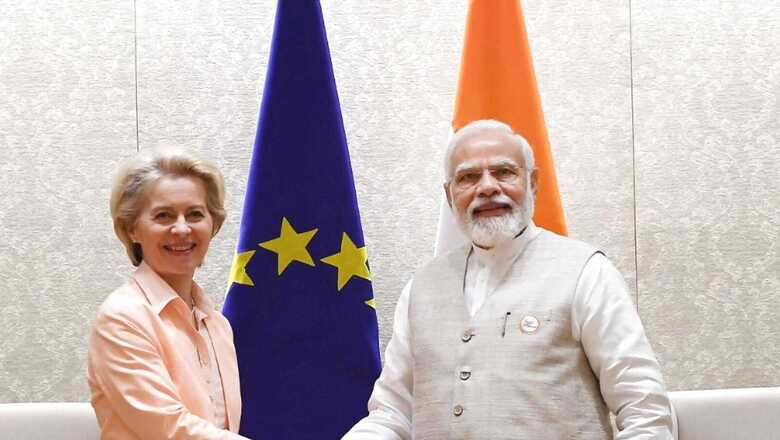
views
Prime Minister Narendra Modi and European Commission President Ursula von der Leyen agreed on Monday to launch the EU-India Trade and Technology Council, a strategic coordination mechanism expected to provide political push and the essential structure to tackle challenges at the nexus of trade, trusted technology, and security.
It will be the second trade and technology council involving the 27-nation European Union (EU) after its first with the United States.
A look at the structure and goals of the US-EU Trade and Technology Council (TTC) may provide insight into what the mechanism involving India may look like.
The TTC is led by three American and two European government officials. The US side is co-chaired by Katherine Tai, US Trade Representative (USTR); Gina Raimondo, Secretary of Commerce; and Antony Blinken, Secretary of State. The EU side is led by Valdis Dombrovkis, European Commission Executive Vice President and EU Commissioner for Trade; and by Margarethe Vestager, European Commission Executive Vice President and Commissioner for Competition.
The council consists of 10 thematic working groups, chaired by relevant US agencies and European Commission services. Here are the details of their mandate as shared in the joint statement at the time of the launch:
Working Group 1 – Technology Standards: The Technology Standards working group is tasked to develop approaches for coordination and cooperation in critical and emerging technology standards including AI and other emerging technologies. The United States and European Union support the development of technical standards in line with our core values, and recognize the importance of international standardisation activities underpinned by core WTO principles. The United States and European Union aim to identify opportunities for collaborative proactive action and to defend our common interests in international standards activities for critical and emerging technologies. As such, we plan to develop both formal and informal cooperation mechanisms to share information regarding technical proposals in specified technology areas and seek opportunities to coordinate on international standards activities. We look forward to fostering participation in standards organizations for civil society organizations, startups, small and medium sized enterprises in emerging technologies.
Working Group 2 – Climate and Clean Tech: Given the great importance of technology to address environmental challenges and connected market opportunities, the Climate and Clean Tech working group is tasked to identify opportunities, measures and incentives to support technology development, transatlantic trade and investment in climate neutral technologies, products and services, including collaboration in third countries, research and innovation, and to jointly explore the methodologies, tools, and technologies for calculating embedded greenhouse gas emissions in global trade.
Working Group 3 – Secure Supply Chains: Alongside the dedicated track on semiconductors, the Secure Supply Chains working group is tasked to focus on advancing respective supply chain resilience and security of supply in key sectors for the green and digital transition and for securing the protection of our citizens. A first focus will be on clean energy, pharmaceuticals, and critical materials. In connection with these sectors, the working group is tasked to seek to: increase transparency of supply and demand; map respective existing sectoral capabilities; exchange information on policy measures and research and development priorities; and cooperate on strategies to promote supply chain resilience and diversification. The dedicated track on semiconductor issues will initially focus on short-term supply chain issues. Cooperation on mid- and long-term strategic semiconductor issues will begin in the relevant TTC working groups ahead of the next TTC Meeting.
Working Group 4 – Information and Communication Technology and Services (ICTS) Security and Competitiveness: The Information and Communications Technology and Services working group is tasked to continue to work towards ensuring security, diversity, interoperability and resilience across the ICT supply chain, including sensitive and critical areas such as 5G, undersea cables, data centers, and cloud infrastructure. The working group is tasked to explore concrete cooperation on development finance for secure and resilient digital connectivity in third countries. The working group is tasked to seek to reinforce cooperation on research and innovation for beyond 5G and 6G systems. The United States and the European Union, in close cooperation with relevant stakeholders, could develop a common vision and roadmap for preparing the next generation of communication technologies towards 6G. The group is also tasked to discuss data security.
Working Group 5 – Data Governance and Technology Platforms: The Data Governance and Technology Platforms working group is tasked to exchange information on our respective approaches to data governance and technology platform governance, seeking consistency and interoperability where feasible. We intend to exchange information and views regarding current and future regulations in both the United States and European Union with a goal of effectively addressing shared concerns, while respecting the full regulatory autonomy of the United States and European Union. We have identified common issues of concern around: illegal and harmful content and their algorithmic amplification, transparency, and access to platforms’ data for researchers as well as the democratic responsibility of online intermediaries. We have also identified a shared interest in using voluntary and multi-stakeholder initiatives to complement regulatory approaches in some areas. We are committed to transatlantic cooperation regarding platform policies that focus on disinformation, product safety, counterfeit products, and other harmful content. We plan to engage with platform companies to improve researchers’ access to data generated by platforms, in order to better understand and be able better to address systemic risks linked to how content spreads online. We also plan to engage in a discussion on effective measures to appropriately address the power of online platforms and ensure effective competition and contestable markets. The working group is also tasked to discuss, alongside other working groups, common approaches on the role of cloud infrastructure and services.
Working Group 6 – Misuse of Technology Threatening Security and Human Rights: The Misuse of Technology to Threaten Security and Human Rights working group is tasked to combat arbitrary or unlawful surveillance, including on social media platforms; explore building an effective mechanism to respond to Internet shutdowns, in conjunction with the G7 and others likeminded countries; work to protect human rights defenders online; and increase transatlantic cooperation to address foreign information manipulation, including disinformation, and interference with democratic processes, while upholding freedom of expression and privacy rights. The working group is tasked to address social scoring systems and to collaborate on projects furthering the development of trustworthy AI.
Working Group 7 – Export Controls: The Export Controls working group is tasked to engage in technical consultations on legislative and regulatory developments and exchange information on risk assessments and licensing good practices, as well as on compliance and enforcement approaches, promote convergent control approaches on sensitive dual-use technologies, and perform joint industry outreach on dual-use export controls.
Working Group 8 – Investment Screening: The Investment Screening working group is tasked to focus on exchanging information on investment trends impacting security, including strategic trends with respect to industries concerned, origin of investments, and types of transactions; on best practices, including with respect to risk analysis and the systems for risk mitigation measures with a focus on sensitive technologies and related sensitive data, which may include personal data; and together with other groups, including Export Controls, develop a holistic view of the policy tools addressing risks related to specific sensitive technologies. The working group is expected to conduct a joint virtual outreach event for stakeholders.
Working Group 9 – Promoting Small- and Medium-sized Enterprises (SME) Access to and Use of Digital Tools: The use of digital tools is a key enabler for SMEs to innovate, grow and compete. Its uptake varies significantly across sectors and regions. Beyond training and education gaps and market access barriers, SMEs face challenges regarding access to technologies, data, and finance. We are committed to ensuring access to digital tools and technologies for SMEs in both the United States and European Union. Working Group 9 is tasked to launch outreach activities that will offer opportunities for SMEs and underserved communities, and their representatives, to share their needs, experience, strategies and best practices with policymakers on both sides of the Atlantic with a view to ensuring a better understanding of the barriers to their digital empowerment. Additionally, through a series of listening sessions with SMEs and underserved communities, as well as the resulting analysis and reporting, the working group is tasked to develop recommendations for U.S. and EU policymakers to implement that will help to accelerate access to and the uptake of digital technologies.
Working Group 10 – Global Trade Challenges: Consistent with the attached statement on global trade challenges, Working Group 10 is tasked to focus on challenges from non-market economic policies and practices, avoiding new and unnecessary technical barriers in products and services of emerging technology, promoting and protecting labor rights and decent work, and, following further consultations, trade and environment issues.
The TTC serves as a forum for the EU and the US to coordinate approaches to key global trade, economic and technology issues, and to deepen transatlantic trade and economic relations based on shared democratic values, the two sides say. This in many ways mirrors the objectives of the India-EU council. It remains to be seen how closely the structure and mandate of the new mechanism will resemble those of the existing model.
(With agency inputs)
Read all the Latest India News here



















Comments
0 comment